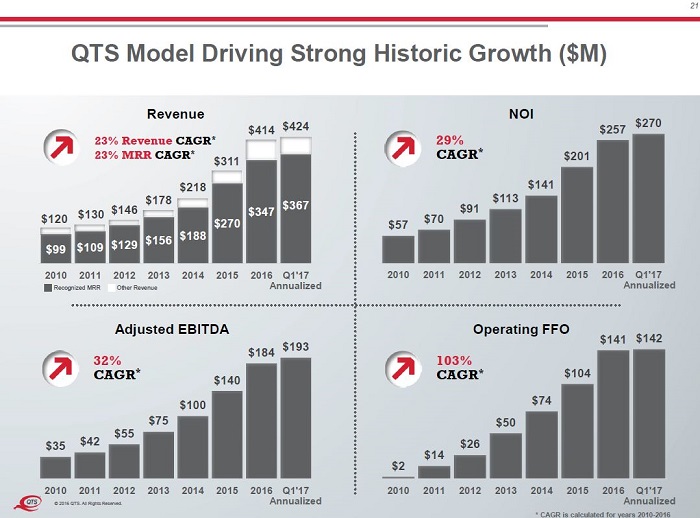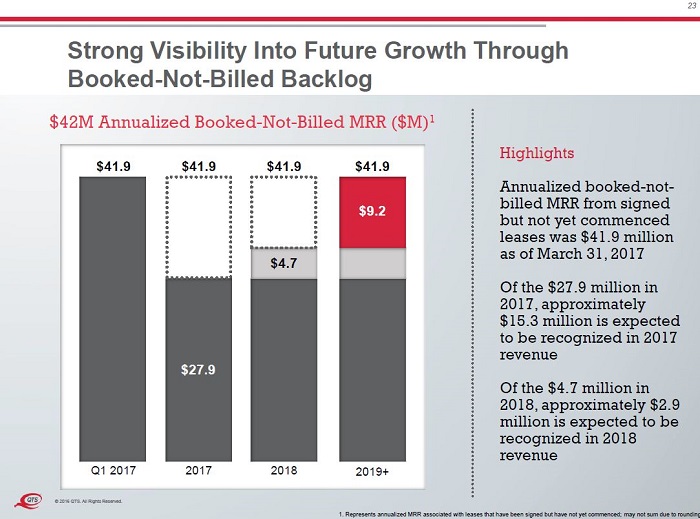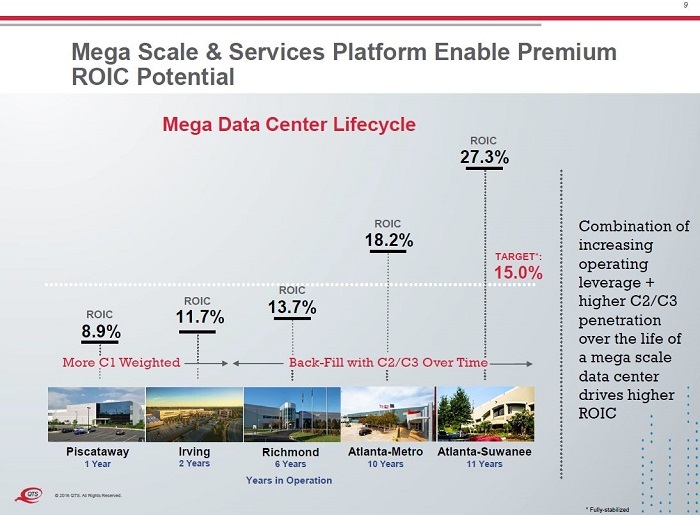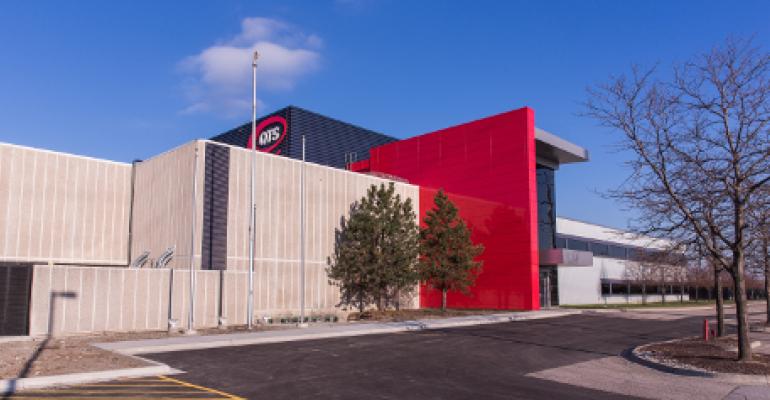All publicly traded companies must balance Wall Street expectations for quarterly performance with being good stewards of capital and executing on a strategic vision for long-term growth.
QTS Realty (QTS) historically has done an excellent job for shareholders by acquiring large infrastructure-rich properties at steep discounts and re-purposing them into state-of-the-art data center campuses.
A focus on both physical and logical security and compliance has been a differentiator for QTS, including multiple FedRAMP approvals for government agencies and contractors to operate. However, the government sector has a notoriously long and unpredictable sales cycle.
The other component of the QTS strategy is providing a complete suite of customer solutions: wholesale, colocation, plus in-house cloud and managed services. This approach has been ideal for co-creating hybrid IT solutions with enterprise customers.
However, QTS has noticed an “inflection point” this year – the complexity of the hybrid IT stack delaying enterprise deployments.
A Slow Start
QTS has been a growth story since its 2013 IPO. However, a confluence of events has created a headwind which has recently caused its shares to under-perform its publicly traded peer group. This included a one-off Q1 2017 churn event with a government contractor vacating a 2MW sub-leased space in N. Virginia (while QTS still had two-years remaining on its own property lease).

Source: QTS Q2’17 investor presentation (this and all other slides included in this article)
Ironically, some of QTS’ strengths may have contributed to a lack of visibility into when deals close and/or delay when lease revenues are recognized.
The company recently announced it will be holding an Investor Day at its newly acquired Fort Worth data center in November to update “the company’s financial outlook and strategic plan to position QTS as the leader in hybrid IT data center solutions.”
Here is a preview of some of the key areas that management will have the opportunity to address.
Hybrid IT: Friend or Foe?
Clearly, the enterprise paradigm shift to a hybrid cloud end-state can be a doouble-edged sword. The days of customers just routinely adding additional servers and expanding colocation cages are now increasingly in the rear-view mirror.
As QTS CFO Jeff Berson told Data Center Knowledge in an interview, the company “has seen an ‘inflection point’ this year with enterprise leasing, as IT stacks are increasingly becoming more complex.”
Berson and his colleagues are proud that QTS has been working for years to architect a complete solution set to offer customers. However, he also pointed out that distributed hybrid IT architecture tends to encompass a much larger decision matrix involving more stakeholders, which slows down the sales process.
Overall, the QTS plan seems to be working. Berson mentioned that QTS has a sales funnel which is at least 30 percent larger than this time last year. However, hybrid IT does not lend itself to “easy wins” and often lacks visibility into when an individual customer requirement will turn into a signed lease.
Backlog: Friend and Foe?
Last week, QTS announced its “HyperBlock” program to underscore the upside embedded in leasing smaller C1 wholesale data halls to public cloud service providers and global SaaS firms.
It is essentially a “land and expand” strategy. These firms can initially lease smaller chunks of space with either contractual provisions to expand or with options and rights of first refusal.

The good news is that the contractual provisions to expand over time help give QTS visibility into its pipeline. The other side of the coin is that a strong quarter of leasing announcements does not translate into revenue growth in 12 to 16 weeks.
The QTS leasing backlog cuts both ways. It doesn’t help next quarter’s financial metrics but it helps to increase earnings visibility and de-risk the future years.
New Campuses Are Dilutive
In January, QTS announced a $50 million sale-leaseback deal in Fort Worth with insurance giant Health Care Services Corp. This also resulted in HCSC becoming an initial 1MW anchor tenant at what is now QTS’ second metro-Dallas data center campus.
Read more: QTS Buys Large Dallas Data Center from Insurer HCSC
The good news for investors was QTS’s ability to buy another high-quality corporate data center, plus adjacent land for expansion, for $6 million per MW. However, in the short run, QTS is paying $50 million for a facility with just 1MW leased. This is dilutive to the QTS stated goal of an overall data center portfolio average of 15% ROIC.

The acquisition of the former DuPont Fabros Technology facility in Piscataway, New Jersey, and the opening of QTS Chicago a year ago (not shown above) were also initially dilutive. Over the next few years, the goal is to increase utilization and operating leverage which will drive higher returns on invested capital, or ROIC.
The QTS Dallas (Irving, Texas) campus has only been in operation for two years and is already approaching 12% returns on capital. Long-term QTS investors will be rewarded down the line, as these facilities lease up and additional phases are developed.
What Is HyperBlock?
The re-branding of its custom wholesale offering to public cloud service and SaaS providers as “HyperBlock” is in a sense a way to re-frame some QTS custom wholesale, or “C1” deployments for Wall Street in order to emphasize client wins in the public cloud or SaaS verticals.
QTS provides timely space, power, and the desired level of services for an initial deployment in the 2MW range. The exact size can vary depending upon the customer requirements and the facility.
Read more: QTS Pitches 2MW Data Center Product to Hyper-Scale Clients
On the surface, there does not appear to be much to differentiate this turnkey delivery of space and power along with a contractual guarantee of expansion space.
However, in May QTS rolled out a new DCIM initiative, Service Delivery Platform. SDP blends in aspects of AI and Machine Learning, which could become a difference maker for customers interested in hybrid IT solutions.
QTS – Service Delivery Platform
According to the company, “QTS has initially launched applications for SDP that provide customers real-time visibility of Power Analytics, Security, Hybrid Cloud Management, and Enterprise IT, among others. By providing programmatic access and control of the data, QTS SDP facilitates customer collaboration to unlock a myriad of opportunities that include:
Predictive modeling and analytics
Enabling more informed and effective business decisions
Improving operational efficiencies and cost savings
Acting on trends in real time
Applied machine learning and enhanced automation”
Once again, this is a more in-depth conversation than simply responding to a consultant or broker RFP for space and power. Throughout 2017, QTS will continue to launch additional SDP applications and features in collaboration with vendors and customers.
Connectivity
QTS has acknowledged being a bit late to the dance when it comes to monetizing cross-connects at its data centers. However, once again this glass can be viewed as half-full by long-term investors.
While today QTS interconnection services only represent 6 percent of revenues, they are growing at a 15 percent clip. New customer signings and existing lease renewals represent opportunities to boost monthly recurring revenue as QTS begins charging for this high-margin service.
Additionally, subsequent to Q1 2017 QTS announced deployment of Packet Fabric’s software defined networking platform to both simplify and amplify customer networking choices and connectivity at its carrier-neutral campuses. These recent connectivity initiatives should also help to reduce churn while simultaneously improving margins going forward.
Bottom Line
Mr. Market tends to myopically focus on short-term performance. Investor Day in November represents an opportunity for management to explain how these recently announced initiatives will combine to make it simpler for QTS customers to deploy hybrid cloud and IT solutions.





